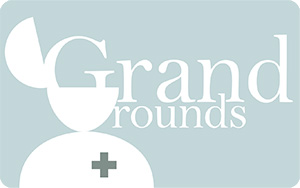 To those who submitted posts, I say thanks. I appreciate that you did. Medical Grand Rounds keeps going because of you, the medical blogger. Your voice, your impressions, your passions and your human stories make our field such a great canvas.
To those who submitted posts, I say thanks. I appreciate that you did. Medical Grand Rounds keeps going because of you, the medical blogger. Your voice, your impressions, your passions and your human stories make our field such a great canvas.
Let’s get it started:
A Hand of Hearts:
 I was delighted that one of the medical blogosphere’s best writers, Dr. Rob Lamberts (@doc_rob) sent me this beautiful post, which recaps three heart-warming patient vignettes. Each brief story celebrates what lies at the heart of medicine—using our skill and compassion to see people through illness. But there’s more. Way more. Dr Rob makes it clear that medicine isn’t a one-way street: that in serving our patients, our hearts are also soothed. Thanks Doc. Glad you are back. Y’all should follow his new blog, More Musings (of a Distractible Kind).
I was delighted that one of the medical blogosphere’s best writers, Dr. Rob Lamberts (@doc_rob) sent me this beautiful post, which recaps three heart-warming patient vignettes. Each brief story celebrates what lies at the heart of medicine—using our skill and compassion to see people through illness. But there’s more. Way more. Dr Rob makes it clear that medicine isn’t a one-way street: that in serving our patients, our hearts are also soothed. Thanks Doc. Glad you are back. Y’all should follow his new blog, More Musings (of a Distractible Kind).
“Pride goeth before the fall.â€
 To me in an email…“Not heart related,†writes the GruntDoc (@gruntdoc) of his post, Pride is a Fall Risk.
To me in an email…“Not heart related,†writes the GruntDoc (@gruntdoc) of his post, Pride is a Fall Risk.
I beg to differ my friend. What could be more heart-related than a poignant story chronicling one of my favorite parts of being a doctor: working with great colleagues? Read this celebration of humility and teamwork in getting a difficult life-saving procedure done. Been on both sides here; and both affect your heart.
Dangerous Love:
 Dr Chris Nickson (@precordialthump), of the Life in the Fast Lane blog wins the poke-the-comfort-zone post of the week, hands down, with his compilation of the dangers of sex. Shh.
Dr Chris Nickson (@precordialthump), of the Life in the Fast Lane blog wins the poke-the-comfort-zone post of the week, hands down, with his compilation of the dangers of sex. Shh.
After a sobering listing of all the medical dangers inherent in sex, CN concludes:
Life is a risky business. It is for the individual to decide if how they live it is worth the risk. But, what would life be without love?
Safer, is one answer.
Don’t miss the case presentation (circa 1884) on penis captivus.
Huge grin!
Exercise as good medicine:
 I made a conscious decision to stay on the side lines of the recent brouhaha concerning the debate about overweight doctors failing to recommend exercise for their patients. Pretty weak, I know.
I made a conscious decision to stay on the side lines of the recent brouhaha concerning the debate about overweight doctors failing to recommend exercise for their patients. Pretty weak, I know.
Thank goodness Dr Elaine Schattner (@ElaineSchattner) from Medical Lessons took the important issue to task. She states the problem: that docs too often fail to advise their patients to exercise; summarizes the ensuing discussion on social media and offers some ideal world scenarios. Nice job Elaine.
Counseling patients about exercise seems easy on the surface but is far from it in real-life. Exercise discussions can devolve quickly. I once had a patient complain to my office manager, “every year I pay Dr Mandrola big dollars to call me fat and out of shape.â€Â
Pass the salt:
 The coveted, prestigious and rarely given brevity award goes to Henry Stern, form InsureBlog. He succinctly notes that the primary source of salt comes from bread and rolls. This is bad news for bike racers. Maybe baguettes are exempt?
The coveted, prestigious and rarely given brevity award goes to Henry Stern, form InsureBlog. He succinctly notes that the primary source of salt comes from bread and rolls. This is bad news for bike racers. Maybe baguettes are exempt?
Seriously though, reducing salt intake touches my heart. For it is one of many simple, safe, non-pill ways of treating high blood pressure. Plus, how neat is it that HS made nutrition short and easy? Thanks for that Henry. My gosh, the minutia of nutrition can get boring, right quick.
Make Death Wait:
 I can’t say enough good things about the Heart Sisters blog by Carolyn Thomas (@HeartSisters). CT, a heart attack survivor turned heart-health evangelist, offers women (and men) clear, concise and personalized information on our leading killer. In this most recent post, “Make time now, so you can have time later,†she leads with this controversial ad. It’s a bit scary, but so is heart disease.
I can’t say enough good things about the Heart Sisters blog by Carolyn Thomas (@HeartSisters). CT, a heart attack survivor turned heart-health evangelist, offers women (and men) clear, concise and personalized information on our leading killer. In this most recent post, “Make time now, so you can have time later,†she leads with this controversial ad. It’s a bit scary, but so is heart disease.
Kudos to you Carolyn. Your work is soothingly anti-inflammatory. Serving the greater good always is.
Patient education is heart-healthy:
![]() Atrial fib is a crazy-complicated disease. Getting AF patients to understand their disease, and treatment, directly impacts outcomes. On her blog, StopAF, uber-AF educator, Melanie True Hills (@stopAfib) contributes mightily to the task of educating AF patients. In this post, MTH points out the pitfalls of ‘settling’ for a rate-controlling strategy of AF. Though clinical trials have shown equivalency of outcomes in rate-control and rhythm-control approaches, we all know that regular rhythm feels better than AF. The problem with AF (as with many diseases) is that patients don’t just face their disease, they also must endure our treatment. All involved with treating AF hope that the treatments soon get better.
Atrial fib is a crazy-complicated disease. Getting AF patients to understand their disease, and treatment, directly impacts outcomes. On her blog, StopAF, uber-AF educator, Melanie True Hills (@stopAfib) contributes mightily to the task of educating AF patients. In this post, MTH points out the pitfalls of ‘settling’ for a rate-controlling strategy of AF. Though clinical trials have shown equivalency of outcomes in rate-control and rhythm-control approaches, we all know that regular rhythm feels better than AF. The problem with AF (as with many diseases) is that patients don’t just face their disease, they also must endure our treatment. All involved with treating AF hope that the treatments soon get better.
One thing is for sure: Ms True-Hills efforts to educate and advocate for AF patients are surely heart-healthy.
The Evidence Matters:
![]() Medical decision-making is undergoing great change. New words have been introduced; “evidence-based,†being one of them. Though clinical judgment will always hold a critical role in medical practice, our ability to understand sometimes-complicated evidence grows more important. Take heart attack treatment for instance: it used to be that all we could offer patients with an occluded artery was aspirin, morphine and a diagnostic catheterization. Now we have technology to rapidly open the artery. But what of the arrays of adjunctive medicines, the right timing of intervention and post-stent care?
Medical decision-making is undergoing great change. New words have been introduced; “evidence-based,†being one of them. Though clinical judgment will always hold a critical role in medical practice, our ability to understand sometimes-complicated evidence grows more important. Take heart attack treatment for instance: it used to be that all we could offer patients with an occluded artery was aspirin, morphine and a diagnostic catheterization. Now we have technology to rapidly open the artery. But what of the arrays of adjunctive medicines, the right timing of intervention and post-stent care?
Dr David Rind, an academic primary care doctor from Boston helps us understand how Evidence In Medicine impacts medical decision-making. Remarkably, he credits (not a typo) a big Pharma company for their efforts to clarify the benefits of the new anti-platelet drug, Ticagrelor. I learned that Ticagrelor’s benefit might depend on the maintenance dose of aspirin.
Hear-hear for plain-speaking academic doctors from Boston.
Take costs to heart:
 Colorado Health Insurance Insider points to the importance of how increasing medical costs lead to higher insurance premiums and thus less disposable income for families. Wow, this healthcare policy stuff is complicated. Princeton Professor Uwe Reinhardt once remarked that ultimately, the US populace is struggling with how much of their own money they are willing to spend for healthcare, say, compared to an auto, a phone and internet. What’s the value of healthcare? The question makes me think of the word parallax; it depends on one’s vantage point.
Colorado Health Insurance Insider points to the importance of how increasing medical costs lead to higher insurance premiums and thus less disposable income for families. Wow, this healthcare policy stuff is complicated. Princeton Professor Uwe Reinhardt once remarked that ultimately, the US populace is struggling with how much of their own money they are willing to spend for healthcare, say, compared to an auto, a phone and internet. What’s the value of healthcare? The question makes me think of the word parallax; it depends on one’s vantage point.
Cold Hearts:
![]() Stunningly, more than one in five patients discover they have heart disease when struck by Sudden Cardiac Death (SCD). Since organ death begins minutes after the heart fibrillates, the majority of these unlucky souls die. Doctors sterilely say, “out-of-hospital cardiac arrest carries a dismal prognosis.†Though preventing heart disease–in the first place–is the best strategy for lowering death rates from SCD, another is intervening quickly and effectively in the community. Enter EMT and first-responders:
Stunningly, more than one in five patients discover they have heart disease when struck by Sudden Cardiac Death (SCD). Since organ death begins minutes after the heart fibrillates, the majority of these unlucky souls die. Doctors sterilely say, “out-of-hospital cardiac arrest carries a dismal prognosis.†Though preventing heart disease–in the first place–is the best strategy for lowering death rates from SCD, another is intervening quickly and effectively in the community. Enter EMT and first-responders:
From his SixLetterVariable blog, author Christopher (one name only, like a rock star perhaps) presents a nice group of post-resuscitation ECGs from an elderly woman after therapeutic hypothermia. Now, it is true; any post with nice ECG records interests me. (Cool Osborne waves!) But it is also my pleasure to highlight a young person so moved by helping people that he would blog about interesting cases. Keep up the good work, sir.
That’s a wrap.
Head over next week to Health Works Collective.
Thanks to Grand Rounds creators and organizers, Dr Val Jones (@drVal) and Dr Nick Genes (@NickGenes).
I’d also like to thank a few other doctor-friends that have helped me immensely. Drs Wes Fisher (@doctorWes), Bryan Vartabedian (@Doctor_V), Kevin Pho (@KevinMD) Ramona Bates (@rlbates), Ves Dimov, (@DrVes), Larry Creswell (@athletesHeart), and of course, the one and only…@JediPD. Thanks all.
JMM
11 replies on “Grand Rounds: February 14th, 2012–Valentine’s Day version”
Good work! Thanks for the top billing! Good to be back.
Thanks Dr. John for including Heart Sisters in this impressive line-up! Thanks as well for introducing us to some sites that may be new to us. Keep up the good work.
Great job, Dr John!
Thanks for hosting, and for including our post.
[…] HADITS, SEJARAH category and has 0 Comments so far. Dr John’s Valentine’s Day-themed collection of medblog posts is bright, cheerful and full of heart-healthy info. Original content copyright © InsureBlog You […]
[…] is Grand Rounds day and, not coincidentally, it is a Valentine’s Day grand rounds done by Dr. John Mandrola. Â My post got the leadoff position, which I am grateful for. Â He did a great job putting […]
Honored to have made the list! However, my coworkers respectfully request that you refrain from encouraging my fledgling singing career…
John, Thanks so much for putting this together. It’s a wonderful edition!
Great compilation of posts, great theme. Thanks for your hard work!
Peggy
Dr. Rob Lamberts’ blog doesn’t allow unregistered comments, but one of his “heartwarming vignettes” is about an asymptomatic moderate-risk woman whom he inexplicably sent for a high-radiation cardiac CT scan, and who, once she was found to have calcified plaque, was told to avoid physical activity until she could be rushed in to the cardiologist. No mention of the facts that calcified plaque is probably less likely to cause heart attacks than uncalcified plaque, or that stenting – which he was blatantly stampeding her towards, as exercise is a critical part of the medical/lifestyle approach to CAD – has no survival benefit over medical management for asymptomatic people and has complications, including cognitive decline, that are far more likely to be irreversible. Magic wand waved, happy person transformed into fearful patient. I bet he wouldn’t understand that I read this story as a reminder not to place too much trust in doctors.
[…] Grand Rounds Vol. 8 No. 21 — the Valentine’s Day version Share this:EmailFacebookStumbleUponSorry, I could find no related posts. This entry was posted in Astronomy, Biology, Carnivalia, Humanity, Space and tagged Astronomy, Biology, Carnivalia, Humanity, Space. Bookmark the permalink. ← Casual Friday — shady business with a lathe […]
[…] do check out the Valentine’s Day edition of Grand Rounds, and Dr. John […]